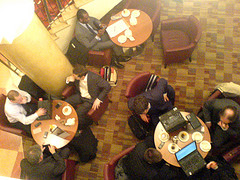Your Personal Computer Travel Safety Guidelines Checklist
23 June 2012
A recent traveler warning by the FBI’s Internet Crime Complaint Center highlights the fact that now, more than ever, travelers must safeguard sensitive data wherever they go – both foreign and domestic.
The FBI warning indicates that there have been multiple instances where travelers’ computers are infected with malicious software while using their hotel Internet connections!
While hotel connections seem to be particularly risky, from a data-security standpoint all travel is inherently risky because the likelihood of sensitive private and corporate data being compromised or stolen increases the minute a person takes their devices outside their normal secure networks.
See this personal checklist for computer travel safety on your next trip.
Before you go
If you’re traveling for business, consider traveling with a sanitized, virus-free, fully updated loaner laptop with minimal software instead of your own fully packed machine. Taking only what you need to do the work you need to do eliminates the risk of having your primary business computer compromised.
Do these steps on all devices – laptops, cell phones, iPods, hand-held organizers, etc. – before you travel:
- Remove unnecessary sensitive data
- Clear your browser cache files
- Remove saved passwords
- Password protect all devices using strong passwords (see guidelines here)
- Backup important data that will travel with you
- Disable remote connectivity such as Bluetooth, wi-fi, and file sharing
While on your trip
If you’re traveling for business, always use your virtual private network, or VPN, which encrypts your communications traffic when you connect from any network, wired or wireless.
While you are traveling, you’ll want to follow these safe computing guidelines:
- Avoid using kiosk computers or public workstations like Internet cafes
- Avoid using any network that requires you to download software to your computer for access
- Remember you have no reasonable expectation of privacy when using your computer in a public place, so use a privacy screen to prevent those nearby from snooping
- Always decline any request from someone else to use your electronic devices
- Always decline to allow others to connect a USB or portable device to your laptop
- Maintain physical possession of your computer and personal electronic devices at all times – do not leave devices unattended in hotel rooms, for example
- Don’t wait until you get home: routinely run checks for viruses and other malicious software during your trip
After you return
The first rule of thumb after you return is to assume that your electronic devices could have been compromised.
Check your computer and other devices for spyware, malware, and viruses before connecting to any campus or commercial networks. Never use USB drives or software received as gifts or promotional items until they have been verified clean by your IT group.
Related topics
Damian Tysdal is the founder of CoverTrip, and is a licensed agent for travel insurance (MA 1883287). He believes travel insurance should be easier to understand, and started the first travel insurance blog in 2006.

